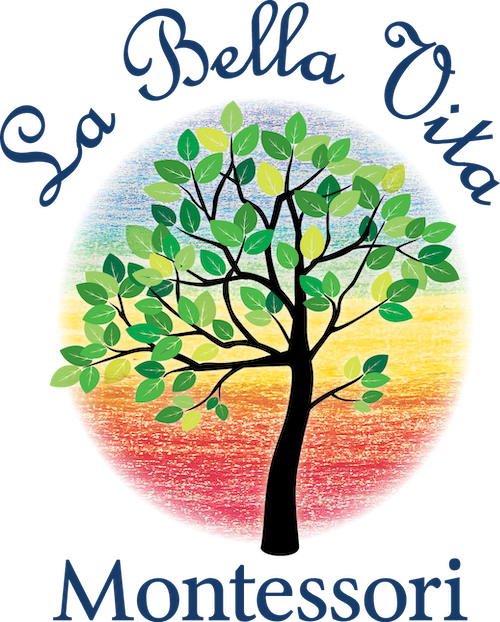Mathematics is a uniquely powerful discipline, one that enables us to comprehend and manipulate quantities of all sorts. Advanced mathematics is indispensable for certain, very lucrative careers. Even in everyday life, fairly advanced mathematics is highly useful. From calculating measurements for a DIY project to working out how many weeks of pocket money is needed to buy a new video game, math is versatile and important. However, the study of mathematics offers gifts far beyond numeracy and calculation. It allows children to develop and exercise their reasoning mind. It teaches students how to evaluate situations, mentally test hypotheses, employ problem-solving strategies, derive conclusions, and articulate them clearly. As has been recognized since the time of the Ancient Greeks, math serves as the best model for, and the best practice for, core aspects of human reasoning. These are critical skills that students will need in their future workplaces, in their personal lives, indeed in every aspect of navigating a world increasingly characterized by demanding, rapid change.
The key outcomes of math education in our elementary programs are two-fold:
A deep understanding of the way numbers work and relate to each other, as well as the ability to manipulate them quickly and easily
The acquisition of cognitive powers and habits that can apply to all other areas of one’s life.
Our student in mathematics gain:
- Explicit competence in foundational domains of mathematics, along with an intuitive number sense;
- The ability to build new knowledge from previous knowledge (by rigorous mathematical inference);
- The ability to organize knowledge into an integrated, hierarchical structure;
- The ability to deploy highly abstract knowledge in solving particular problems;
- The ability to participate in discussion and debate with others using clear, step-wise reasoning and truths (such as measurements and prior axioms)
Our Mathematics Pedagogy
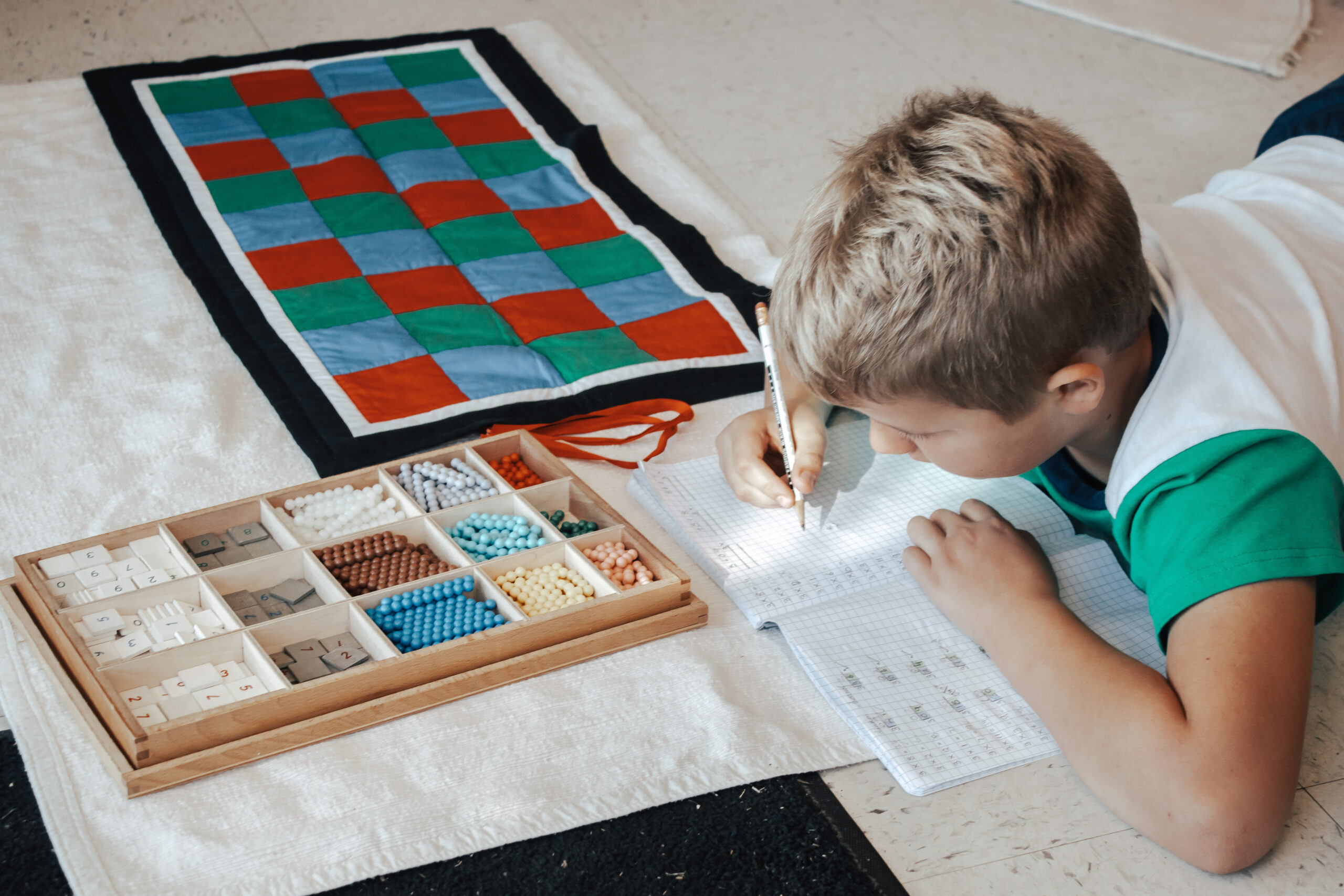
Hands on Learning
Our math curriculum at La Bella Vita Montessori begins with hands-on materials that foster an intuition of quantity, place value, and geometry. By manipulating these scientifically designed examples of abstract ideas, students build a library of experiences that develop into mental models of mathematical principles. A set of developmentally and mathematically refined hands-on Montessori learning materials, along with unique learning materials developed by our pedagogy team, forms the backbone of the math curriculum. Each learning material not only concretizes but isolates an aspect of mathematics. The cleanliness and objectivity of math is manifest in the learning materials, and reinforced in the more abstract presentations. Definitions are clear and concise, statements are correct and precise, and problems are solved by laying bare every step. The precision and isolation in the materials allows students to practice one skill or concept at a time, repeated as often as needed for mastery.
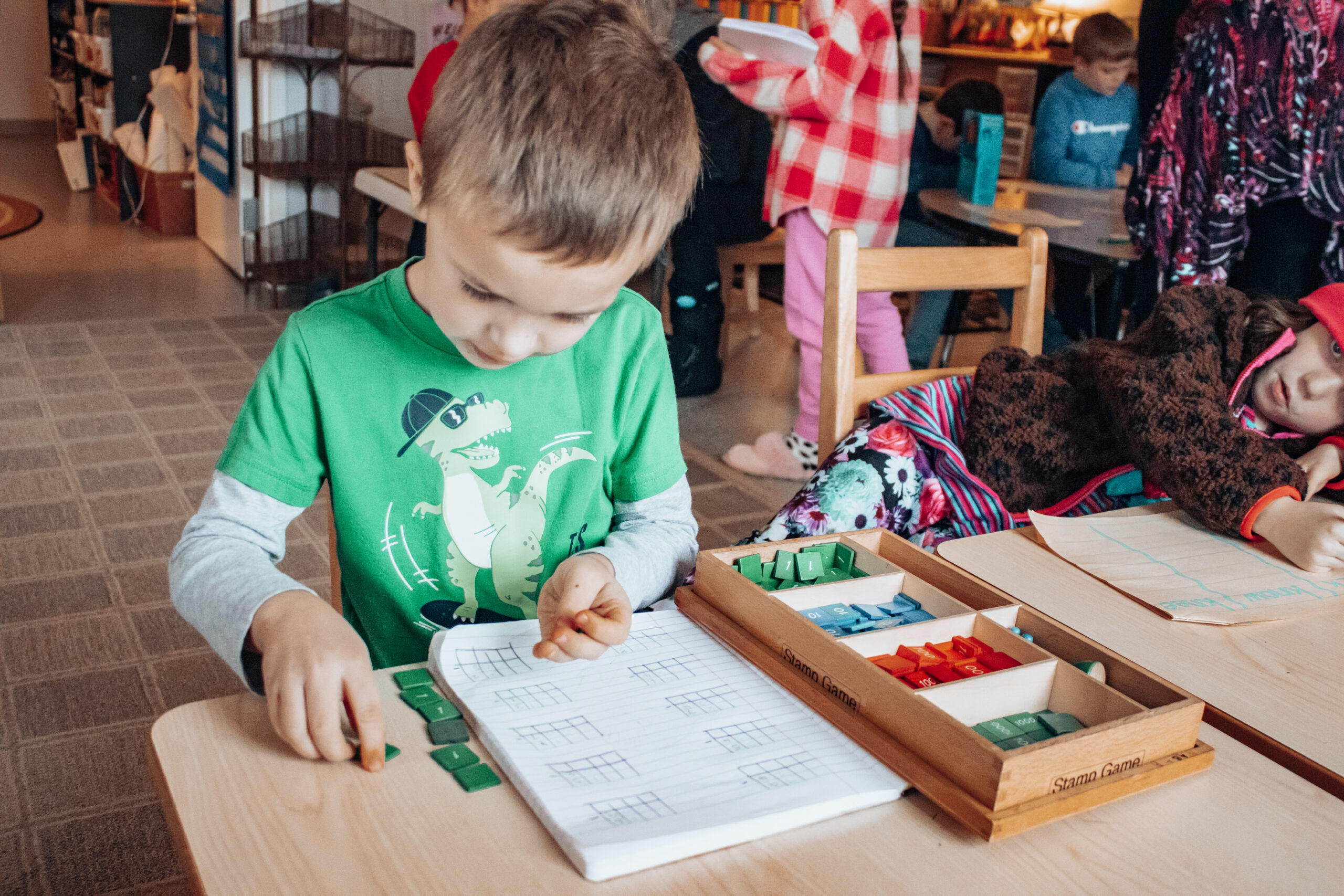
A Developmental Sequence for Math
Our program is carefully sequenced to follow each student’s development. As the result of a thoughtfully ordered curriculum, the approach is intelligible to the student at each step. Our general pedagogy demands grounding knowledge in the child’s own experience, progressing from concretes that are directly accessible to the student, up to more abstract knowledge, with each stage providing the foundation for the next. Math is no exception. Each material, lesson, and activity builds on the strong foundation of the previous ones, and seeds are continuously laid to facilitate integrations years later. The binomial cube, for example, presented as a puzzle for Montessori preschool students, leads to a geometric-algebraic integration of binomial expansions.
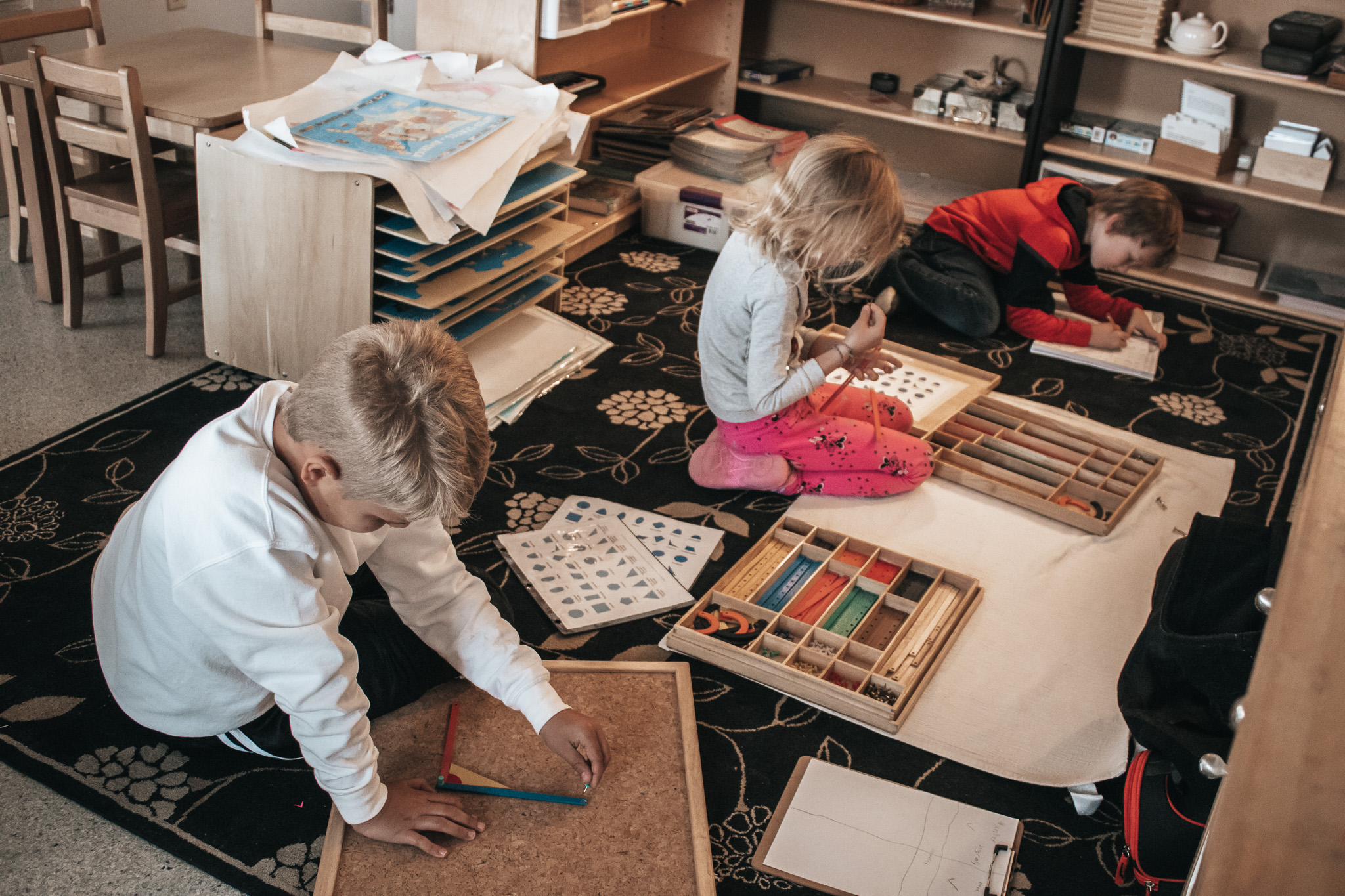
Mastery-Based Learning
At La Bella Vita Montessori, the students do work that enables them to fully master the mathematical content. Math lessons are most often presented to individuals or pairs of students. When students need more time or support in a particular area, they have as many lessons and as much time as they need; for students who grasp an area quickly, there is the opportunity to swiftly move ahead. And so, children progress at their own pace, consolidating a deep conceptual understanding of mathematical ideas while creating a solid foundation for future, more complex studies.
The materials, again, are designed to be thoroughly engaging so that repetition, a requirement of mastery, is not punishing but enjoyable. The material grounds more abstract mathematical work, such as word problems, facilitating the ability of students to apply it to the real world. The materials and approach allow them to think in a way that is both fully conceptual and also visual, intuitive, sometimes even literally physical. Students can thus explore and practice the math they are learning to the point where it represents real understanding that can be independently and creatively applied.
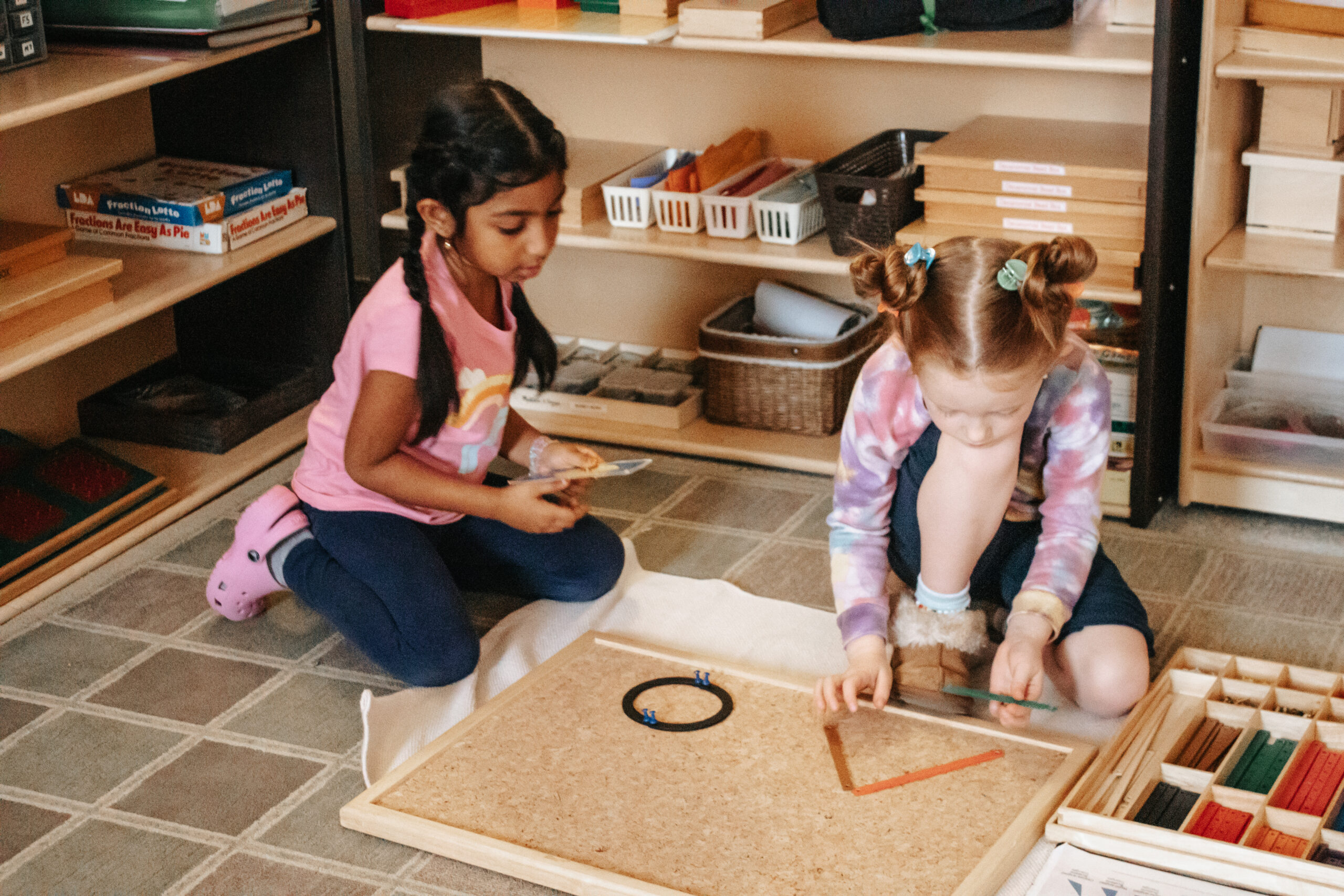
Math in Our Classrooms
The basic implementation of mathematics follows a sequence of teacher presentations and student activities in accordance with the guidelines above: engaging, hands-on, manipulation-based learning, with precise mathematical content that is crystallized into concepts, done at a pace that is challenging and in an order that is accessible. In addition, key units are punctuated by group discussions, guided by the teacher in a way that clarifies and unifies the knowledge of the students.
The highest-level goals of mathematics education in our elementary program are the cognitive ones listed above. The specific mathematical content that represents the realization of those goals in elementary are:
- Fluency with non-negative rational numbers and operations. Students in our programs develop a clear concept of non-negative integers, fractions, and decimals and can abstractly manipulate them in any combination using addition, subtraction, multiplication, and division. In addition to providing important material for mathematical reasoning and discussions, this content paves the way to fluency with all real numbers in algebra.
- Basic skills and knowledge in equations, algorithms, and geometry. These topics prepare students for algebra, coding, planimetrics, and stereometry. Combined with non-negative rational number arithmetic, these constitute the foundation of all higher-level mathematics.
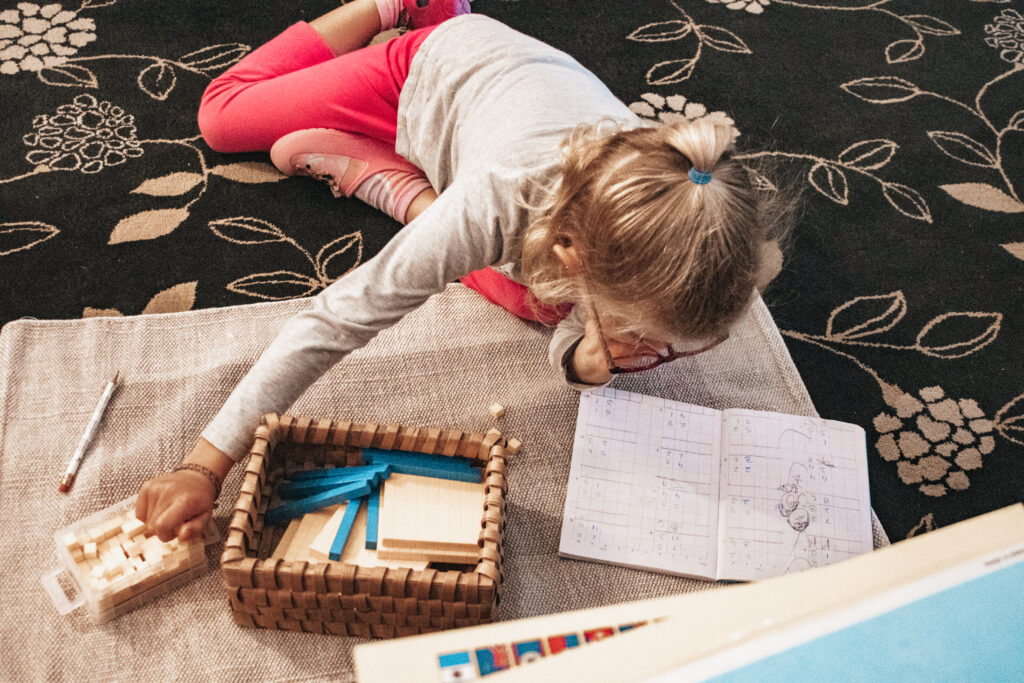
The topics covered in lower elementary are:
- Mathematical Conversation (equality and basic operations)
- The Decimal System, Categories and Numeration
- Addition
- Subtraction
- Multiplication
- Division
- Coding
- Fraction Prerequisites
- Preliminary Sensorial Work with Fractions, Exponents, and Squaring
The content covered in upper elementary is:
- Fractions
- Mixed Numbers
- Decimals
- Ratios and Proportions
- Graphing
- Exponents
- Negative Numbers
